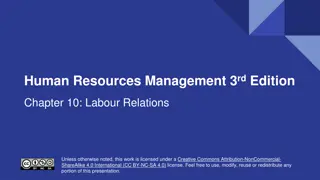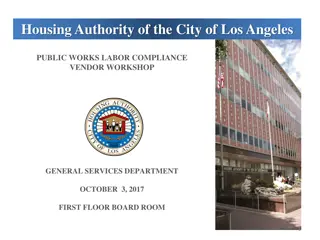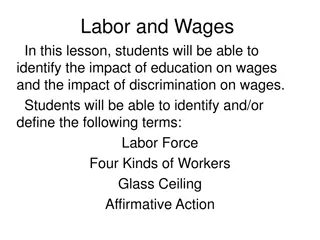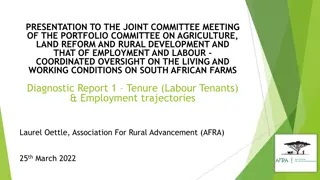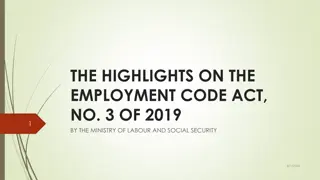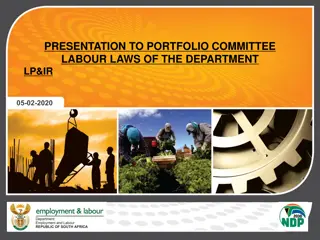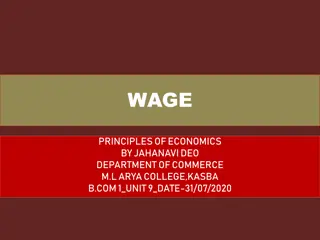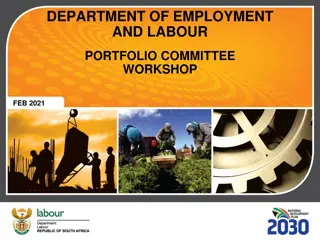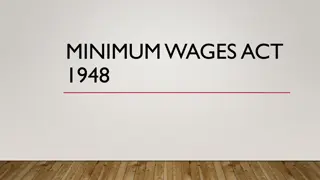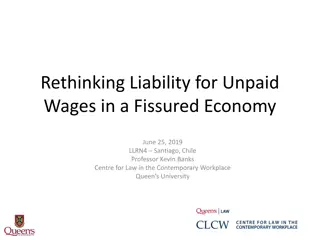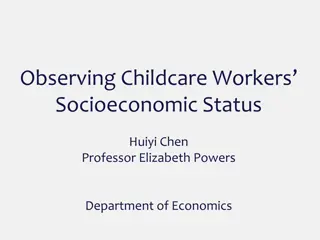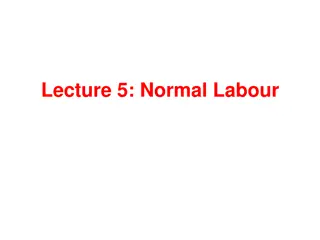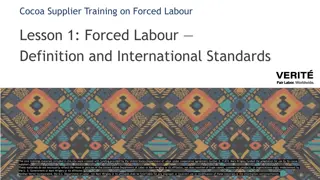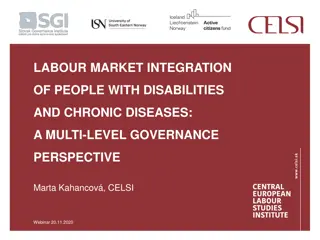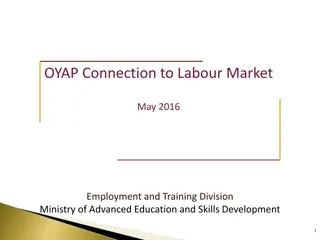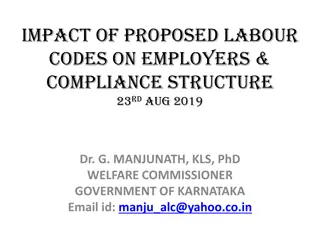Recent Changes in Labour Laws and Code on Wages, 2019
The recent changes in labour laws involve the amalgamation of 44 laws into 4 codes, focusing on wages, occupational safety, industrial relations, and social security. The Code on Wages, 2019, aims to amend and consolidate laws related to wages and bonus, applicable to all employees in India. The Code subsumes important labour laws like Payment of Wages Act, Minimum Wages Act, Payment of Bonus Act, and Equal Remuneration Act. Stay informed about the key updates in labour laws and be prepared for the upcoming changes.
Download Presentation

Please find below an Image/Link to download the presentation.
The content on the website is provided AS IS for your information and personal use only. It may not be sold, licensed, or shared on other websites without obtaining consent from the author. Download presentation by click this link. If you encounter any issues during the download, it is possible that the publisher has removed the file from their server.
E N D
Presentation Transcript
Index Preliminary Recent Labour law changes / reforms Initiative by Central Government Initiative by Government of Maharashtra Highlights of Code on Wages, 2019
Labour Laws - History Origin- Conflict of Economic Interest Directive Principles of State Policy Positive obligations of the State Article 38 & 39 Secure social order, Health and Strength of workers, Equal pay for equal work , Protection of Child Labour etc. Article 42 Provision for just and humane Conditions of Work ( Basis of Labour Laws) and maternity relief. Living Wages=Basic needs + Comfort( PF, ESI, Pension), conditions of work ensuring a decent standard of life Participation of worker in Management Representative - Works Committee, Health and Safety Committee, Trade Union, Standing Orders etc. Article 43 Article 43A
Preliminary As part of Labour reform initiatives, the Labour Ministry has decided to amalgamate 44 Labour Laws into 4 Codes. The 4 Codes are as under: Code on Wages Code on Occupational Safety, Health and Working Conditions Code on Industrial Relations Code on Social Security 1. 2. 3. 4.
Code on Wages 2019 The Code on Wages, 2019 received the assent of the president on 8th August 2019. Code on Wages (Central) Rules, 2019 draft rules were published on 1st November 2019. Soon Government of Maharashtra will publish rules on Code on Wages 2019.
Code on Wages 2019 Once the effective date of the Code on Wages is notified, it shall subsume and repeal the following important labour laws: The Payment of Wages Act, 1936 (POWA) The Minimum Wages Act, 1948 (MWA) The Payment of Bonus Act, 1965 (POBA) The Equal Remuneration Act, 1976 (ERA) 1. 2. 3. 4.
Code on Wages 2019 An Act to amend and consolidate laws relating to wages and bonus. It has 9 different chapters. It extends to whole of India. Applicable to all employees irrespective of their wage limit and type of employment. Different dates may be appointed to different provisions for its commencement.
Code on Occupational Safety, Health and Working Conditions The Government on 3rd December 2019 introduced the Code on Occupational Safety, Health and Working Conditions Bill, a move opposed by the opposition which demanded that the proposed legislations be sent to a standing committee for Scrutiny. The proposed Code would be applicable to all establishments employing 10 or more workers, where any industry, trade, business, manufacture or occupation is carried on, including IT establishments or establishments of service sector. The Code also merge 13 Central Labour laws ( Factories Act, Mines Act) into a single code which would apply to all establishments employing 10 or more workers.
Code on Industrial Relations Labour Minister Santosh Kumar Gangwar, on 5th December 2019 introduced the Labour Code on Industrial Relations, 2019 Bill in the Lok Sabha. The Bill aims to streamline industrial relations and help India improve on the ease of doing business index. The Bill consolidates essential elements of three laws the Trade Unions Act, 1926, the Industrial Employment (Standing Orders) Act, 1946, and the Industrial Disputes Act, 1947 helping improve ease of doing business.
Code on Social Security Union Environment Minister Mr. Prakash Javadekar on 4th December 2019 said that the Union Cabinet has approved the fourth Labour Code -- the Code on Social Security Bill 2019. The bill seeks to consolidate the laws relating to social security of workers and subsume 8 Central laws including EPF and ESI.
New Proposals Companies will soon not require multiple Registrations. Government has proposed one License, one Registration, and one Return for establishments. (on line with international labor policy) Labour License for executing projects for 5 years. (presently 1 year) Compulsory Appointment Letters for all workers- Format of Salary slip, Appointment letters will be published by the Government.
New Proposals All establishments hiring at least 10 employees will be covered under the Labour laws. (presently 20 or more) In a bid to address the issue of inspectorraj , the Centre has proposed Facilitators outside their randomised computer system . assigning Inspector-cum- jurisdiction through The number of Labour law provisions will reduce from 622 to 134 under the proposed code.
Key proposals for Employee Minimum wage for all workers, even in the unorganised sector. Statutory floor for minimum wage for states to keep in mind while fixing minimum wage-National minimum wage Limitation period for filing claims for wages increased to three years from 6 months-2 years
Key proposals for Employer Clear and common definition of wage help to calculate dues PF, ESI, leave encashment, gratuity etc presently each Act has different concept of wage. Number of minimum wages to be reduced. Reduction in litigation as government will appoint official to impose fines, instead of case going to tribunal- subject matter of litigation is very complex- human being and their emotions and demands are difficult to handle. Provision for compounding of offences introduced.
Initiatives of Central Government Payment of Bonus Act 1965 eligibility limit for payment of bonus enhanced from Rs 10000/- to Rs. 21000/- per month and the Calculation Ceiling from Rs. 3500/- to Rs. 7000/- or the minimum wages, whichever is higher. We are awaiting change in eligibility limit of Rs. 21,000 now merged into Code on Wages 2019. Payment of Wages (Amendment) Act, 2017:enabling payment of Wages to employees by Cash or Cheque or crediting it to their bank account now merged into Code on Wages 2019.
Initiatives of Central Government Child Labour (Prohibition and Regulation ) Amendment Act, 2016- provides for complete ban on employment of children below 14 years in any occupation or process. Maternity Benefit Amendment Act, 2017- increases the paid maternity leave from 12 weeks to 26 weeks- Medical bonus Gross salary as against basic salary nomination- application in form I-, clause in appointment letter- 12 weeks for 3rd child. The Employee Compensation(Amendment) Act - seeks to rationalize penalties and strengthen the rights of the workers under the Act- clause in appointment letter.
Initiatives of Central Government The Payment of Gratuity Act (Amendment)2018, -provides flexibility to the Central Government firstly to increase the ceiling limit of gratuity to such amount as may be notified from time to time and secondly to enhance the calculation of continuous service for the purpose of gratuity in case of female employees who are on maternity leave to such period as may be notified from time to time. Vide notification dated 20th March 2018 the ceiling limit of gratuity has been increased from Rs. 10 Lakh to 20 Lakh and this period of maternity leave for calculation purpose has been enhanced from 12 weeks to 26 weeks continuous service 4 years and 8 months or 5 years- transfer of an employee from one group and other group and their claim for gratuity?
Initiatives of Central Government Ministry has notified Ease of Compliance to maintain Registers under various Labour Laws Rules, 2017 on 21stFebruary 2017 which has in effect replaced the 56 Registers/Forms under 9 Central Labour Laws and Rules made there under in to 5 common Registers/Forms. This will save efforts, costs and lessen the compliance burden by various establishments. Very low response on the part of Industry.
Initiatives of Central Government A Model Shop and Estblishment (RE&CS) bill 2016: has been circulated to all States/UTs for adoption with appropriate modification. The said Bill inter alia provides for freedom to operate an Establishment for 365 days in a year without any restriction on opening/closing time and enables employment of women during night shifts if adequate safety provisions exist.
Initiatives of Central Government Under Industrial Employment (Standing Orders) Act, 1946, the category i.e. Fixed Term Employment, with all Statutory Benefits, has been extended to all Sectors to impart flexibility to an establishment to employ people to meet the fluctuating demands, vide the Industrial Employment (Standing Orders) Central (Amendment)Rules, 2019- Hire and fire policy more suitable for Auto Industry and IT/ITES companies
Initiatives of Central Government Ministry has also notified Rationalization of Forms and Reports under Certain Labour Rules, 2017 28.03.2017 for reduction of number of Forms / Returns under 3 Central Acts / Rules from 36 to 12 by reviewing redundant and overlapping fields. on UnifiedAnnual Return: returns have been made mandatory in respect of the these Central Labour Acts [the Payment of Wages Act, 1936, the Minimum Wages Act, 1948, the Maternity Benefit Act, 1961, the Payment of Bonus Act, 1965, the Industrial Disputes Act, 1947] on the Shram Suvidha Portal".
Initiatives of Government of Maharashtra The Government has formulated Self-Certification Scheme- Cum-Consolidated Annual Return Scheme for all the shops/ Establishment/Factories under various Labour Laws (16 Acts), vide Government resolution No. MISC- 2015/CR- 76/Desk Lab-9 Mantralaya, Mumbai - 400 032. Dated 23rd June, 2015., with the following objectives:- To increase transparency in the system of inspections so as to enable the employees as well as employers to focus on the core issues of their businesses A new system for enforcement of various labour laws with simplification in maintenance of various records and registers required under different labour laws.
Initiatives of Government of Maharashtra To reduce visits of the Government officers / inspectors for inspection of Shops/ Establishment / Factories without compromising on safety, health, welfare and social security of workers /employees Allow all the shops/ Establishment/Factories to submit consolidated annual returns in lieu of multiple returns under various labour laws Only one company filed an application to avail the benefit in the State of Maharashtra.
Initiatives of Government of Maharashtra The Government has fixed time limit of 7 working days for issuing registration and renewal certificate under the The Maharashtra Shops And Establishments Regulations Of Employment And Conditions Of Service) Act, 2017 and Contract Labour(Regulation and Abolition) Act, and The Contract Labour (Regulation & Abolition) Act, 1970 The Government has prescribed inspections procedure for the Department of Labour and Commissioner of Labour as per Online Inspection System.
Implementation of New Shop Act 2017 Implementation of the Maharashtra Shops And Establishments Regulations Of Employment And Conditions Of Service) Act, 2017 New Act- applicable for 10 or more employees. Employer can work 365 days no restrictions on opening and closing hours Intimation to Labour Department if employee count is less than 10- newly incorporated Companies/ LLP shall sent intimation. License can be renewed up to 10 years.
Implementation of New Shop Act 2017 Employer to provide First aid facility Employer to provide Cr che facility if employees are more than 50 Employer to provide Canteen facility if employees are more than 100 Employer to Constitute Health and Safety Committee if employees are more than 100 Annul Return to be filed on or before February end. Penalties for non-compliance are from Rs. 1Lacs to 5 Lacs.
Impact of POSH Act, 2013 As per MCA notification dated 31st July 2018 [Rule 8(x) of the Companies(Accounts) Rules,2014]- the report of the board shall contain: a statement that the company has complied with provisions relating to the constitution of Internal Complaint Committee under the Sexual Harassment of Women at Workplace Act (Prevention, Prohibition and Redressal), 2013
Impact of POSH Act, 2013 On 9thMay, 2016, The Amendments Act 2016 was published and the amendments included: for the words Internal Complaints Committee , wherever they occur, the words Internal Committee shall be substituted .
Impact of POSH Act, 2013 Section 22 - Employer to include information in Annual report The employer shall include in its report the number of cases filed, if any and their disposal under this Act in the annual report of his organization.
IC [Composition & Characteristics] Every employer which engages 10 or more employees shall by order in writing constitute IC. IC shall be constituted at all administrative units or offices. Failure to constitute an IC will be punishable offence and all business license can be cancelled or withdrawn.
IC [Composition & Characteristics] a presiding office of IC shall be a woman employed at senior level at workplace it can be appointed from other offices or administrative units of the same workplace or other workplace of the same employer. Not less than two members from amongst employees preferably committed to the cause of women or who have had experience in social work or have legal knowledge
IC [Composition & Characteristics] one member from amongst non-governmental organization or associations committed to cause of women or a person familiar with the issues relating to sexual harassment External member One- half of the members shall be women. Advisable to have 3 female and two male members to avoid tie in the decision making
IC [Composition & Characteristics] IC members shall hold office for a period of 3 years from the date of their nomination mostly ignored. External member are entitled for fees, allowance (Rs.200 per day for inquiry proceedings) and reimbursement of travelling expenses. When any member contravenes provisions of the Act [e.g. confidentiality], such members shall be removed from IC and the said casual vacancy shall be filled by fresh nomination.
IC [Composition & Characteristics] External member shall be a social worker with at least 5 years of experience in the filed of social work which leads to creation of societal conditions favourable towards empowerment of women and in particular in addressing harassment. workplace sexual External member can be a person who is familiar with labour, service, civil or criminal law.
IC [Composition & Characteristics] IC members shall have requisite qualifications otherwise the same can be challenged in the High Court. Constitution of IC becomes illegal if external member is not appointed. Aggrieved woman may approach High Court for constitution of proper IC. IC member is an independent body and no member of IC shall be biased.
Impact of POSH Act, 2013 Government of Maharashtra has issued a general letter mandating all establishments in Maharashtra to constitute and register their IC constituted as per POSH Act. In this regard, the employers are required to fill in the details of their IC in the prescribed form and submit it with the Sub-Divisional Magistrate, Old Custom House, Shaheed Bhagat Singh Road, Fort, Mumbai 400001 on or before 20 July 2019. ( Mumbai or Pune ???) Can we send it now? Any failure by employers in the State of Maharashtra to comply with the above requirement, shall be punishable with INR 50,000.
Recent SC order and EPF Act The Regional Provident Commissioner(II) West Bengal v/s Vivekanand Vidyamandir & Others[Civil Appeal No. 6221 of 2011] The respondent is an unaided school giving special allowance by way of incentive to teaching and non teaching staff as per the agreement between the Management and the staff. The incentive was reviewed from time to time upon enhancement of the tuition fees.
Recent SC order and EPF Act The authority under the Act held that the special allowance was to be included in the basic wage for deduction of PF. The matter went upto SC for final decision. SC passed order on 28.02.2019
Crux of the appeals to SC The appeals raise a common question of law, if the specialallowance paid by an employer to its employees would fall within the expression basic wages under Section 2(b)(ii) read with Section 6 of the EPF Act for computation of deduction towards PF. In other words, whether PF shall be deducted on Special allowances.
SC Ruling on allowances- 28.02.2019 SC said that following allowances shall be added to basic wages: Allowances that are not variable in nature, i.e. all fixed allowances- fixed conveyance, lunch, medical allowance[ magic word balancing figure in salary statement in the name special allowance] Allowances that are not linked to any incentive paid resulting in greater output by the employee,- allowances not linked to performance or output Allowances that are paid universally,necessarily and ordinarily, across to all the employees example Rs. 1000/- paid to all employees as a telephone allowance/food allowance etc
Is SC order Retrospective? It is unclear on whether this ruling will be applicable with retrospective effect. Retrospective significant financial impact to employers and employees alike. SC has reiterated the Bridge and Roof case. implementation may result in The judgment merely interprets the law or section
Threshold limit is Rs. 15,000/- Relevant to this matter, are the provisions of Section 2(f) of EPF Act read with Paragraph 26 (1) and (6) of the EPF Scheme. Provident Fund contributions on wages in excess of INR 15,000 are voluntary and not mandatory. This means that for domestic employees any contribution on wages in excess of INR 15,000 is not mandatory.
Impact on Employee Implementation of the Supreme Court Ruling will largely impact employees whose Basic is equal or less than INR. 15,000/- Employers may have to add other allowances to basic wages to be compliant and this will result in reduction in take home salary of the employee. A positive impact on employee s wealth creation for retirement by way of increase in Provident Fund accumulations in employee s individual account.
Impact on Employer Increase in Employer s share of contributions towards Provident Fund EPFO has initiated inspections and scrutiny to check the compliance level of wage structure. This may result in greater scrutiny and inspections and potential penalties for non-payment of contributions on other allowances. We also expect greater focus on contractor PF compliance.
Recent Changes in ESI Act ESI contribution has rate changed Employer 3.75% [Old4.75%] [Old1.75%]. and Employee 0.75% Registration of an employee within 10 days of the date of appointment- if not done ESIC will send show cause notice Employer to submit relevant document within 15 days of show cause notice- new process vide notification dated 3rd December 2019.


